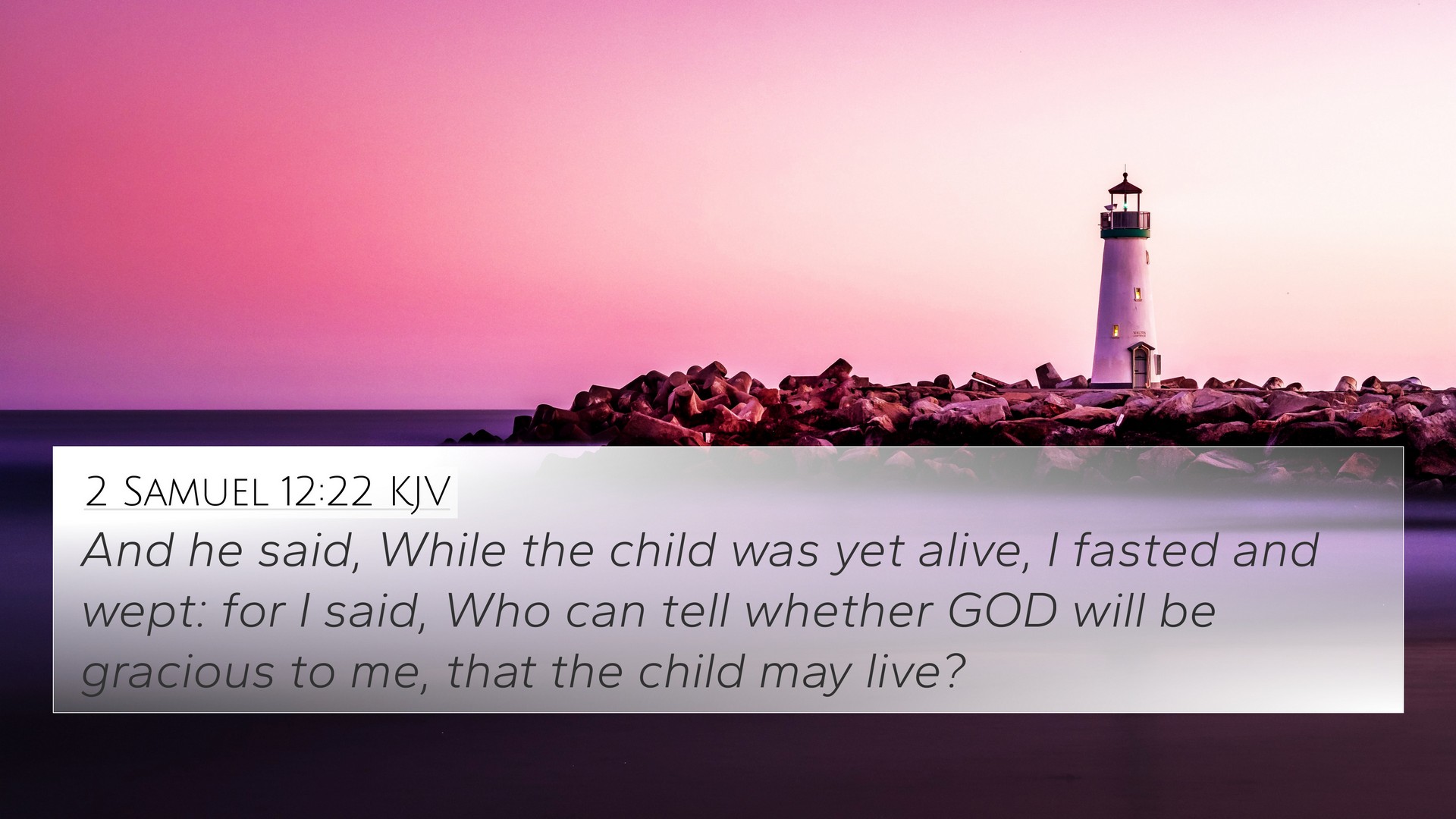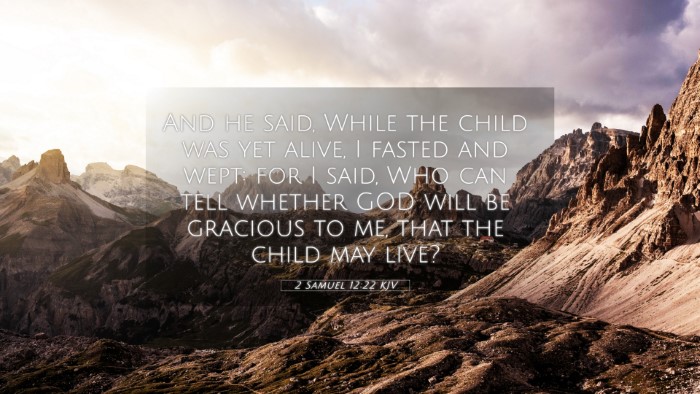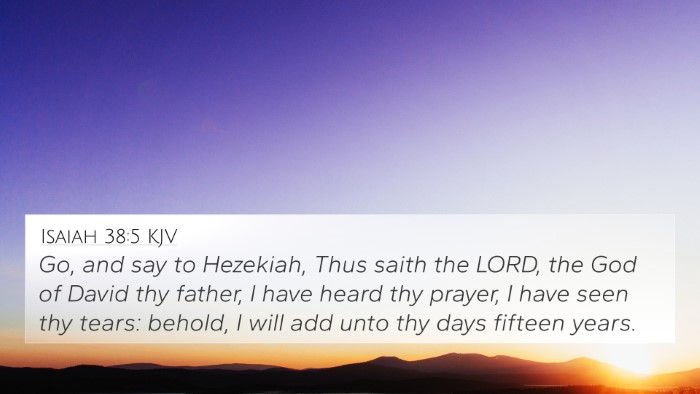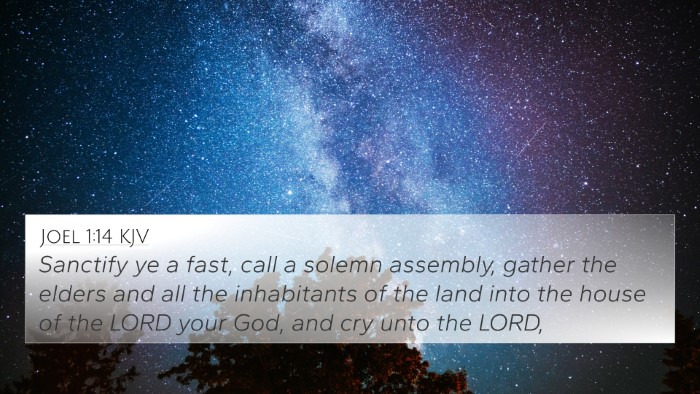Understanding 2 Samuel 12:22
The Bible verse 2 Samuel 12:22 states: "But he said, 'While the child was alive, I fasted and wept; for I said, "Who knows, whether the Lord will be gracious to me, that the child may live?"'"
This verse is part of a poignant narrative where King David mourns the illness of his newborn son, born from his union with Bathsheba. Here, David reflects on the futility of his desperate prayers and fasting in hopes of divine mercy.
Commentary Insights
Various public domain commentaries provide in-depth interpretations of this verse, drawing on historical and theological contexts.
Matthew Henry's Commentary
Matthew Henry emphasizes the profound sorrow of David, highlighting his earnest attempts to plead with God for his child's life. Henry points out that David understood the gravity of his sin, and his actions were steeped in repentance and a genuine hope for mercy. David’s fasting served not only as a plea for his son but also as a demonstration of deep personal anguish and faith in God's character. Henry notes the implicit message of God's sovereignty, indicating that David's efforts, while sincere, could not change God’s plan.
Albert Barnes' Commentary
Albert Barnes elaborates on the psychological and spiritual state of David, suggesting that the fast was a clear expression of his faith, accompanied by the understanding that God’s decisions are ultimately beyond human influence. Barnes argues that David's actions reflect a universal human experience—the desire to alter fate through fervent prayer. He underscores that this moment illustrates the tension between human desperation and divine will, paving the way for discussions on the nature of prayer and its purpose.
Adam Clarke's Commentary
Adam Clarke brings a theological lens by interpreting the implications of David’s mourning. He notes that this passage not only reflects David’s immense grief but also his eventual acceptance of God's will after the child's death. Clarke suggests that this experience teaches believers about the complexities of divine providence, contrasting human desires with God's ultimate plans. He highlights themes of repentance and the recognition of sin, framing David's actions within the broader redemptive narrative of Scripture.
Cross References and Thematic Connections
To better understand 2 Samuel 12:22, one can explore various cross-references that echo its themes of grief, divine sovereignty, and the nature of prayer. Here are some pertinent connections:
- Psalm 51:1-4 - David's confession of sin and plea for mercy after his transgression with Bathsheba, illustrating a heart seeking restoration.
- 2 Samuel 12:16 - Prior to verse 22, this verse describes David’s intense pleading with God for the child’s life.
- Isaiah 57:1-2 - Offers a perspective on the fate of the righteous in death, providing a theological lens on the suffering of the living.
- 1 Chronicles 21:17 - David’s recognition of the consequences of sin fosters a deeper understanding of the burdens of leadership and personal responsibility.
- James 5:16-18 - This New Testament passage encourages prayer as a means of spiritual action, reflecting the struggles of the faithful.
- Romans 8:28 - Highlights God’s providence, assuring believers that all things work together for good, despite current sorrows.
- Matthew 26:39 - Jesus’ plea in Gethsemane exemplifies the struggle between personal desire and submission to God’s will.
- Luke 18:1-8 - The parable of the persistent widow underscores the importance of unceasing prayer, even in adversity.
- Philippians 4:6-7 - Addresses anxiety through prayer, tying back to David’s anxious moments of fasting and praying.
- 2 Corinthians 1:3-4 - Encouragement for believers to find comfort in God, resonating with the themes of grief and divine care.
Conclusion
The exploration of 2 Samuel 12:22 through various commentaries unveils layers of meaning encompassing themes of sorrow, repentance, and the human experience in the face of divine will. By cross-referencing this verse with others, believers can gain a better understanding of the continuity of God's work throughout Scripture.










